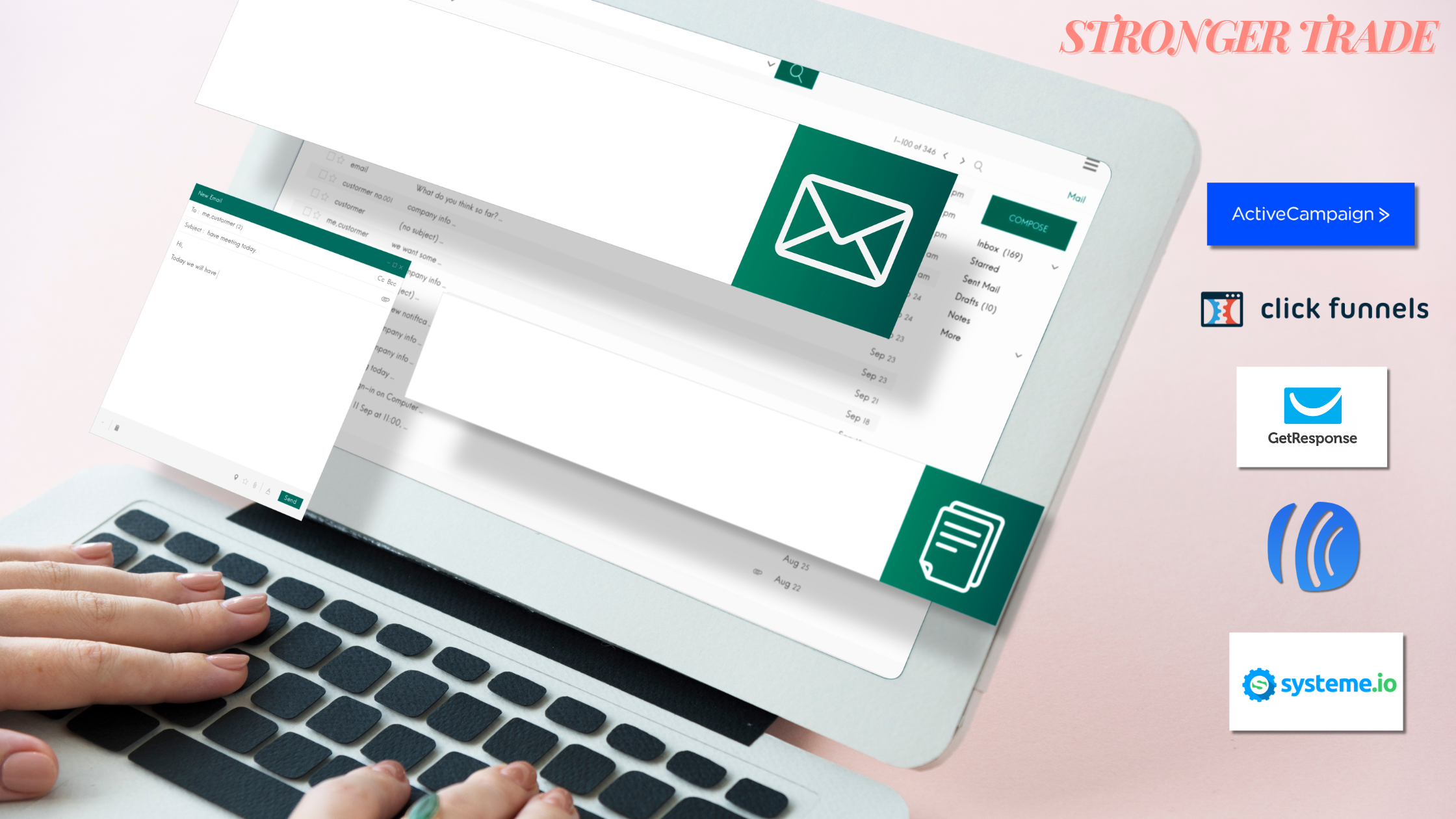In today’s digital landscape, email marketing for small business has emerged as a crucial strategy for reaching customers and driving sales. With its cost-effectiveness and ability to foster direct communication, many small business owners find themselves asking, should small businesses use email marketing? This blog post explores the benefits, key features of effective email marketing tools, best practices, and answers to frequently asked questions, helping you navigate the world of email marketing and harness its full potential for your business growth.
Table of Contents
What is Email Marketing for Small Business?
Email marketing for small business refers to the use of email to promote products or services, build relationships with customers, and drive engagement. It’s one of the most cost-effective and powerful marketing strategies available, enabling small businesses to directly communicate with their target audience.
Unlike social media or paid ads, email marketing allows small businesses to reach their customers in a more personal and direct way. By sending well-crafted messages, businesses can share updates, promotions, or helpful content that keeps their audience engaged and coming back for more.
For small businesses, email marketing offers several advantages:
- Affordable: Even with a tight budget, email marketing tools provide plans that are accessible for small businesses.
- Targeted: You can send specific messages to different segments of your customer base, making your marketing more relevant.
- Measurable: Track open rates, click-throughs, and conversions to understand how well your campaigns are performing.
Overall, email marketing for small business is about building meaningful connections, enhancing brand loyalty, and driving sales—all while maintaining a budget-friendly approach.
Benefits of Email Marketing for Small Businesses
Email marketing offers several key benefits that make it an ideal choice for small businesses looking to grow their customer base and increase revenue. Here are some of the most significant advantages:
- Cost-Effective Email marketing for small businesses is highly affordable compared to other marketing channels. You don’t need a big budget to reach a large audience, and most email marketing tools offer pricing plans that scale with your business. This makes it an accessible option even for those just starting out.
- Direct Communication with Your Audience Unlike social media or other advertising platforms, email marketing allows you to send messages directly to your customers’ inboxes. This creates a more personal connection and gives you the chance to communicate important updates, offers, and content in a way that feels one-on-one.
- Increased Customer Retention Email marketing helps small businesses stay top-of-mind with their customers. Regular, relevant emails keep your audience engaged with your brand, which can lead to improved customer loyalty and repeat business. A well-timed email can be the difference between a one-time buyer and a long-term customer.
- Personalization and Targeting Email marketing platforms allow small businesses to segment their audience and send personalized content. This means you can tailor your messages to specific customer groups, improving engagement and conversion rates. For example, you can create targeted campaigns based on customer behavior, interests, or demographics.
- Measurable Results One of the greatest benefits of email marketing for small businesses is the ability to track and measure your success. With detailed analytics, you can monitor open rates, click-through rates, and conversion rates, helping you fine-tune your strategy for better results.
- Boosts Sales and Conversions Email marketing is a proven driver of sales. With the right messaging, a well-crafted email can guide customers down the sales funnel, whether you’re promoting a product, service, or special offer. Small businesses can use email marketing to nurture leads and convert them into paying customers.
In summary, email marketing for small businesses provides a cost-effective, direct, and measurable way to engage customers and grow your business. By leveraging its benefits, small businesses can build strong customer relationships and boost their bottom line.
Key Features to Look for in Email Marketing Tools
When choosing email marketing tools for small business, it’s important to select one that offers the right features to support your growth and engagement efforts. Here are the key features to look for:
- Ease of Use Small business owners often juggle multiple tasks, so finding an email marketing tool that is easy to use is crucial. Look for platforms with intuitive interfaces, drag-and-drop editors, and simple setup processes. This allows you to create and manage campaigns quickly, even if you don’t have a technical background.
- Automation Automation is a game-changer for small businesses. Email marketing tools with automation features allow you to set up workflows, such as welcome emails, drip campaigns, and follow-up messages, that are sent automatically based on customer behavior. This saves time and ensures consistent communication with your audience.
- Segmentation and Personalization Effective email marketing for small businesses relies on sending the right message to the right audience. Look for tools that allow you to segment your email list based on factors like customer preferences, purchase history, or engagement levels. Personalization features, such as inserting the recipient’s name or tailoring content to their interests, can significantly boost engagement.
- Analytics and Reporting To measure the success of your email campaigns, it’s important to choose a tool that offers detailed analytics and reporting. Metrics like open rates, click-through rates, and conversions give you insights into what’s working and where you can improve. This data-driven approach helps optimize your email marketing strategy over time.
- Integration with Other Platforms Your email marketing tool should integrate seamlessly with other tools you use, such as CRM systems, eCommerce platforms, or social media. This ensures that your customer data is synced across systems, making it easier to run targeted campaigns and track customer interactions.
- Scalability As your small business grows, your email marketing needs will evolve. Look for email marketing tools that can scale with your business, offering more advanced features, higher send limits, or additional integrations as you expand.
In summary, when choosing email marketing tools for small business, prioritize features that will simplify your workflow, enhance customer engagement, and provide actionable insights. These key features ensure that your email marketing efforts are efficient, personalized, and results-driven.
Top Email Marketing Tools for Small Businesses

Choosing the right email marketing tool is essential for small businesses to run effective campaigns. Here are five of the top email marketing tools for small businesses, each offering unique features to help you grow and engage with your audience:
1. ActiveCampaign
ActiveCampaign is a powerful tool that combines email marketing with CRM and automation features. It’s known for its advanced automation capabilities, allowing small businesses to set up complex workflows with ease. ActiveCampaign also offers robust segmentation, making it simple to send personalized emails that resonate with your audience. With a focus on automation, it’s perfect for businesses looking to streamline their marketing efforts.
When choosing the right tool, consider the differences between platforms. For a detailed comparison, check out our article on ActiveCampaign vs ClickFunnels 2024 – Which is the Best Email Marketing?
2. ClickFunnels
ClickFunnels is more than just an email marketing tool—it’s a complete sales funnel builder. For small businesses focused on conversions and lead generation, ClickFunnels integrates email marketing into its funnel system. It allows you to create landing pages, automate email follow-ups, and track customer behavior, all within one platform. If your business prioritizes sales funnels and automation, ClickFunnels is an excellent choice.
If you’re still deciding between GetResponse and ClickFunnels, our article on GetResponse vs ClickFunnels: Which is the Best for Your Business in 2024? can provide valuable insights.
3. AWeber
AWeber is a popular email marketing platform known for its simplicity and ease of use, making it ideal for small businesses just starting with email marketing. It offers a drag-and-drop email builder, pre-designed templates, and basic automation features. AWeber is a cost-effective option with all the essential tools to manage your email campaigns, without overwhelming you with advanced features.
For those considering AWeber or GetResponse, it’s worth reading our comparison in AWeber vs GetResponse: A Comprehensive Comparison of Features and Pricing to help inform your choice.
4. GetResponse
GetResponse is a comprehensive marketing platform that includes email marketing, automation, landing pages, and webinars. Its email marketing features are easy to use, with automation workflows that help you nurture leads and engage your audience. GetResponse is ideal for small businesses that want an all-in-one platform to handle email marketing and other aspects of their online marketing strategy.
To better understand the features that can enhance your email marketing for small business, read our comprehensive analysis in GetResponse vs ActiveCampaign: A Detailed Feature Comparison.
5. Systeme IO
Systeme IO is an all-in-one marketing platform designed for small businesses looking for an affordable yet effective tool. It offers email marketing alongside sales funnels, membership sites, and automation features. Systeme IO’s simplicity and affordability make it a great option for businesses looking for a streamlined solution that covers both email marketing and other digital marketing needs.
Each of these email marketing tools for small businesses offers unique benefits, whether you’re focused on automation, ease of use, or building sales funnels. By selecting the right tool, you can improve your email marketing efforts and better engage your audience.
How to Choose the Right Email Marketing Tool for Your Small Business
Selecting the right email marketing tool for your small business is crucial to the success of your marketing efforts. With so many options available, here are the key factors to consider when making your decision:
1. Identify Your Business Needs
Start by evaluating what your small business needs from an email marketing tool. Do you need advanced automation features? Are you looking for simple, easy-to-use software? Understanding your specific requirements will help narrow down your options.
2. Consider Your Budget
Email marketing tools come with different pricing plans, ranging from free versions to premium packages. Small businesses often need to balance affordability with features. Look for tools that offer flexible pricing plans that can grow with your business, ensuring that you get the most value for your money.
3. Ease of Use
If you don’t have a dedicated marketing team, ease of use is critical. Choose a tool with an intuitive interface, drag-and-drop editors, and easy setup processes. A user-friendly platform will save you time and allow you to focus on creating effective campaigns rather than managing technical details.
4. Automation and Personalization
Automation is a powerful feature that allows small businesses to send emails based on customer actions, such as purchases or sign-ups. Personalization capabilities, such as inserting customer names or recommending products based on past behavior, also help increase engagement. Make sure the email marketing tool you choose has strong automation and personalization options to enhance your marketing.
5. Analytics and Reporting
Analytics are essential for tracking the success of your campaigns. Look for tools that offer detailed reporting, including open rates, click-through rates, and conversions. This data will help you fine-tune your strategy and improve future campaigns.
6. Integration with Other Tools
Your email marketing tool should integrate seamlessly with other tools you use, such as your CRM, eCommerce platform, or social media accounts. This ensures that your marketing data flows smoothly between platforms, making it easier to manage customer relationships and run more effective campaigns.
7. Scalability
As your small business grows, your email marketing needs will evolve. Choose a tool that offers scalability, allowing you to access more features, higher sending limits, and additional integrations as your business expands. This will save you the hassle of switching tools down the line.
In summary, choosing the right email marketing tool for your small business involves evaluating your needs, budget, and long-term growth potential. By focusing on ease of use, automation, analytics, and integrations, you’ll find the perfect tool to help your business thrive through email marketing.
Best Practices for Small Business Email Marketing

To make the most of email marketing for your small business, it’s important to follow best practices that can boost engagement, build customer relationships, and drive results. Here are some key strategies:
1. Build a Quality Email List
One of the first steps in successful email marketing for small business is building a high-quality email list. Focus on collecting emails from interested customers or potential leads. Avoid purchasing email lists, as these often result in low engagement and could harm your sender reputation.
2. Segment Your Audience
Segmentation allows you to group your subscribers based on criteria such as interests, purchase history, or demographics. By sending targeted, relevant content to each group, you can increase engagement and improve conversion rates. For example, a small business could create different segments for new customers, repeat buyers, or those who haven’t engaged in a while.
3. Personalize Your Emails
Personalization goes beyond just using the recipient’s name. Tailor your content based on user behavior, preferences, or location. Personalization in email marketing helps small businesses build stronger connections with customers and delivers a more customized experience that leads to higher open and click-through rates.
4. Craft Compelling Subject Lines
Your subject line is the first thing your audience will see. Keep it clear, concise, and compelling. A well-crafted subject line encourages recipients to open your email, while a vague or generic one may go unnoticed. Experiment with different styles, such as using urgency, curiosity, or a personal touch, to see what resonates with your audience.
5. Optimize for Mobile
A significant portion of email is opened on mobile devices, so it’s critical that your emails are mobile-friendly. Use responsive design templates to ensure your emails look great on all screen sizes. Keep your content concise, and make sure links and call-to-action (CTA) buttons are easy to tap.
6. Test and Optimize
Regularly test different elements of your email campaigns, such as subject lines, CTAs, and email formats. A/B testing allows you to identify what works best with your audience and continuously improve your results. Small businesses can use this data to refine their email marketing strategy over time.
7. Monitor Performance Metrics
Keep track of key metrics like open rates, click-through rates, and conversions. These insights help you understand how well your email marketing campaigns are performing and where improvements can be made. Monitoring these metrics is crucial for small businesses to stay agile and adjust their strategy based on real-time feedback.
8. Stay Consistent, But Don’t Overwhelm
Consistency is important for maintaining customer engagement, but avoid overwhelming your audience with too many emails. Find a frequency that works for your business and your subscribers, whether it’s weekly, biweekly, or monthly. Ensure that every email you send adds value to your audience, rather than simply filling up their inbox.
By following these best practices, small businesses can leverage email marketing to build meaningful relationships with their audience, drive engagement, and increase conversions. Implementing these strategies will help maximize the impact of your email campaigns while keeping subscribers happy and engaged.
Conclusion
Email marketing for small businesses is a powerful tool for building customer relationships, increasing engagement, and driving sales. By choosing the right email marketing tool, following best practices, and focusing on delivering valuable content, small businesses can effectively reach their audience and grow their brand.
Whether you’re just starting out or looking to improve your current email marketing strategy, platforms like ActiveCampaign, ClickFunnels, AWeber, GetResponse, and Systeme IO offer the features and flexibility to meet your needs. With careful planning, segmentation, and personalized communication, email marketing can become one of your most reliable and cost-effective marketing channels.
As you implement these strategies, remember that consistency, testing, and attention to customer feedback are key to long-term success. Start building your email list today and unlock the full potential of email marketing for your small business.
FAQs
1. What is email marketing for small business?
Email marketing for small business involves using email to communicate with customers, promote products or services, and build relationships. It allows businesses to reach their audience directly, delivering targeted messages that can lead to increased engagement and sales.
2. Why is email marketing important for small businesses?
Email marketing is crucial for small businesses because it is cost-effective, allows for personalized communication, and provides measurable results. It helps maintain customer relationships, increases brand awareness, and drives conversions, all of which are essential for growth.
3. How can I build an email list for my small business?
You can build an email list by offering incentives such as discounts, freebies, or exclusive content in exchange for subscribers’ email addresses. Utilize sign-up forms on your website, social media, and during events to encourage sign-ups. Always ensure that you have permission to email your contacts.
4. What features should I look for in email marketing tools?
When choosing email marketing tools for small business, look for ease of use, automation capabilities, segmentation options, detailed analytics, and integrations with other platforms. These features will help you create effective campaigns and track your success.
5. How often should I send emails to my subscribers?
The frequency of your emails depends on your audience and the content you have to share. Generally, sending emails weekly or biweekly is a good practice, but it’s essential to find a balance that keeps your subscribers engaged without overwhelming them.
6. What type of content should I include in my emails?
Your email content should be relevant and valuable to your audience. Consider including promotional offers, product updates, educational content, and personalized recommendations. Always aim to provide something that adds value to your subscribers.
7. How can I measure the success of my email marketing campaigns?
You can measure the success of your email marketing campaigns by tracking key performance metrics such as open rates, click-through rates, conversion rates, and unsubscribe rates. Analyzing these metrics will help you understand what works and where to improve.





